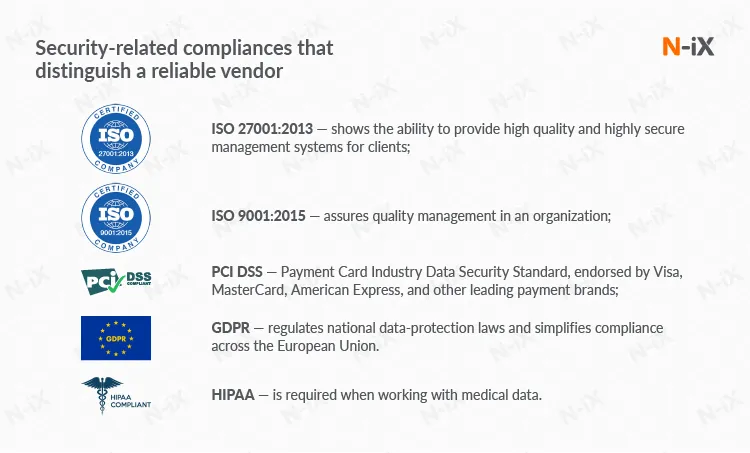With software product engineering, businesses can obtain truly unique and game-changing solutions. They usually have long-lasting effects on the business, changing the way it operates and develops in the long run.
However, there are many questions that you need to answer before you opt for product engineering since it usually requires significant investment in both time and resources. What’s the difference between software product engineering services and regular development, and which one better suits your needs? What does a typical product engineering process look like, and what can you expect? We will answer all of these questions, and more, in our article.
Software product engineering vs software development: which one to choose?
Let’s shine some light on the difference between software development and software product engineering. These terms are often used interchangeably, even though each has its own distinct characteristics.
What is software development?
Software development is the process of designing and building a piece of software to solve a particular need or problem. It helps businesses optimize their operations, expand and improve their service offerings, optimize costs, etc. Software development usually operates on one of two models:
- Extended team. Your tech partner provides experts with the right technical know-how that join and work together with your in-house team. You take an active part in the recruitment process of every member and manage all their day-to-day operations.
- Managed team. Your tech partner recruits, builds, and manages an entire development team that takes over the development of a particular part of your project. The team works independently and provides regular progress updates.
What is software product engineering?
Product engineering is a complex process that consists of multiple stages and focuses on changing and improving the way the entire business operates, both in the short and the long term. In addition to design, coding, and support, this end-to-end solution development can include idea validation, creation of PoCs or MVPs, assessment of the internal processes of the client’s company, market and competitor research, etc.
Teams formed by the tech partner consist of a wide range of experts, from regular software and quality assurance engineers to business analysts, system architects, UI/UX designers, and more. As a result, partnerships with companies that provide software product engineering services are usually longer and more strategic, lasting years.
Over the course of cooperation, a reliable partner ensures that the solution(s) they deliver meet the 4 main acceptance criteria:
- Equipped with the required functionality;
- Meets your quality standards;
- Ensures convenient and intuitive user experience;
- Offers high durability and security.

The key stages of engineering a software product
Software product engineering usually consists of two distinct steps which ensure that all the aforementioned acceptance criteria are met. These steps are Audit (for existing projects) or Product Discovery (for building solutions from scratch) and Implementation, which also includes testing, maintenance, and support. Let’s take a closer look at what each of these steps brings to the table.
Discovery phase: building a solid foundation
Building a reliable software product that meets all your requirements needs careful preparation and a clear implementation plan. This is exactly what the Discovery is for.
Your software product engineering services provider forms a team of high-level experts, such as system architects, business analysts, project coordinators, UX experts, etc., who dive deep into your internal business processes, audit your existing systems, and evaluate your needs and ideas. An average Discovery phase lasts about 3-4 weeks and can be performed both online and on-site. The result of this phase is a set of business, design, architecture, and project plan deliverables that are necessary to kick off the development cycle.

Implementation: the nitty-gritty of product engineering
This is the step where the actual technical implementation takes place. Your tech partner recruits and builds a team with the required size and expertise to deliver the project within the agreed time and cost estimates. The partner also takes care of the day-to-day management of the team while providing you with regular updates about the roadmap, major milestones, and releases.
Software product engineering is a continuous process, which means that even after the delivery of the initial product your cooperation can continue with the team providing maintenance and introducing new features.

How to pick the right partner to develop a software product?
Picking a reliable software product engineering services provider is crucial, since, as mentioned before, such projects often require substantial investments in both time and resources. Therefore, we have compiled a list of useful tips to help you make the right choice.
1. Research the companies that have experience with product development
Not every tech company offers software product engineering services, since such projects are very often quite complex and require significant experience and expertise. Do your research and create a shortlist of vendors that have a portfolio of end-to-end development, rather than simple outsourcing or team extension.
2. Assess the offered services and expertise
After you have a shortlist of companies with the right size and a strong HR brand, you need to assess the services and expertise they offer. Prioritize companies that have a wide selection of services and a solid portfolio of successfully delivered projects that prove their expertise.
An important thing to keep in mind is that even if you do not have an outstanding need for a particular expertise, this may change over the course of your cooperation. As technologies evolve, they may open new opportunities that you would want to benefit from. Therefore, having a partner that can quickly fill a newly-appeared gap in technical expertise can be a great advantage.
3. Inquire about the knowledge transfer plan
Since software product engineering can be a timely process, it is not unlikely for experts (or even entire service providers) to change. Therefore, it is of utmost importance that your tech partner has a robust knowledge transfer plan in place that will allow to quickly onboard new employees or hand over the development process to a new vendor. There are 3 factors that can help you identify the quality of a company’s knowledge transfer plan:
- Types of data that are gathered on organizational, team, and individual levels;
- Entities that transfer and receive information;
- Tools and techniques that ensure knowledge retention and transfer (for example, knowledge sharing sessions, demos, presentations, tech talks, etc.).

4. Examine what security measures and practices and put in place
Your software product engineering services provider will have direct access to your internal systems. Therefore, it is crucial to make sure that the company you are partnering with has the necessary security measures in place to protect your business from vulnerabilities. Pay especially close attention to the best practices of secure software development used by the company’s engineers. Inquire the following:
- Are they using data caching?
- Are they encrypting data traffic?
- Are they implementing static code analyzers?
- Are they looking for vulnerabilities when using third-party libraries?
In addition to the best practices of secure development, the entire company has to comply with the established data protection standards, such as GDPR, PCI DSS, HIPAA, etc.

5. Pick a company with the right size and a strong HR brand
When it comes to choosing a partner for software product engineering, there are two things that you need to pay attention to straight from the get-go: their size and HR brand. Mid- and large-sized companies are an obvious pick here, since they are much faster at forming teams with the right size, technical know-how, and experience to kick-off the projects as quickly as possible. Furthermore, a larger talent pool allows companies to quickly scale a team and maintain the same delivery levels when additional workload appears.
A strong HR brand boosts this process even further, as highly-skilled experts are more likely to join companies with a good reputation, ensuring the highest levels of development quality.
How software product engineering services can change a business: Featured success story
Now that we have explored it in more detail, let’s take a look at how real-life software product engineering can change and improve a business. The success story we will explore is N-iX’s partnership with a leading UK-based car dealership.
The challenge: inefficient manual warranty processing
N-iX’s client (under NDA) needed to boost the efficiency of their warranty management and data handling processes. These processes involved lots of paperwork and tasks that had to be completed manually, which, in turn, took up lots of time and often led to human errors.
The solution: engineering a cloud-based platform from scratch
Our cooperation began with an extensive Discovery phase performed by N-iX’s Solution group. During 2 weeks our experts visited the client on site to analyze their existing systems, interview end-users (mechanics), and create a product design of the solution complete with both the business and technical vision.
After the Discovery phase, the N-iX team began implementing the cloud-based solution. Within 4 months the client acquired the initial product version which streamlined and automated data transferring between technicians and warranty administrators. Ever since our team has released multiple new features and provided support and maintenance.
The value delivered: efficient warranty handling of a growing customer base
With this solution, our customer is able to save substantial amounts of time spent on warranty handling and around 5% of all warranty claim reimbursements. Moreover, the solution allows our customer to save 2-3 FTEs annually, reducing their expenses even further. Learn more about our partnership here.
How can you benefit from N-iX software product engineering services?
- N-iX has over 20 years of experience in providing software product engineering services;
- We have 2,400+ employees with a wide range of expertise, from Big Data and AI to Cloud Development to IoT;
- N-iX has formed long-lasting partnerships with leading global enterprises from various industries, including telecom, automotive, manufacturing, and more;
- N-iX has received high rankings and multiple awards from various platforms such as Clutch, Goodfirms, or DOU, supporting our company’s strong HR brand;
- We ensure a safe and secure software development process by complying with various data security standards, such as ISO 27001:2013 and ISO 9001:2015, PCI DSS, GDPR, and HIPAA.
Have a question?
Speak to an expert



